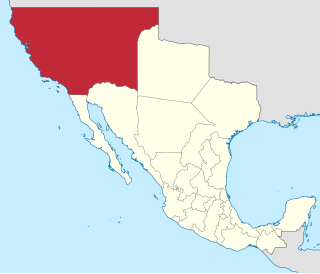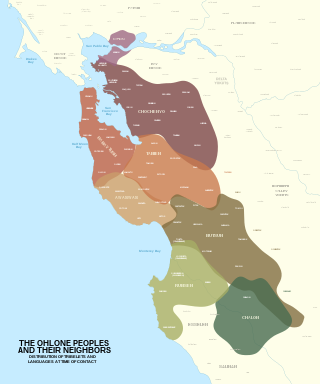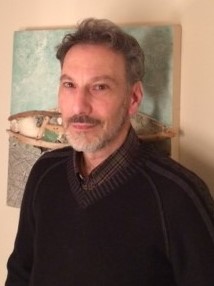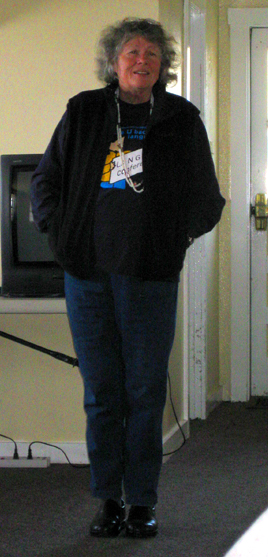
Alta California, also known as Nueva California among other names, was a province of New Spain formally established in 1804. Along with the Baja California peninsula, it had previously comprised the province of Las Californias, but was made a separate province in 1804. Following the Mexican War of Independence, it became a territory of Mexico in April 1822 and was renamed Alta California in 1824.

The Ohlone, formerly known as Costanoans, are a Native American people of the Northern California coast. When Spanish explorers and missionaries arrived in the late 18th century, the Ohlone inhabited the area along the coast from San Francisco Bay through Monterey Bay to the lower Salinas Valley. At that time they spoke a variety of related languages. The Ohlone languages make up a sub-family of the Utian language family. Older proposals place Utian within the Penutian language phylum, while newer proposals group it as Yok-Utian.

The Coast Miwok are an Indigenous people of California that were the second-largest tribe of the Miwok people. Coast Miwok inhabited the general area of modern Marin County and southern Sonoma County in Northern California, from the Golden Gate north to Duncans Point and eastward to Sonoma Creek. Coast Miwok included the Bodega Bay Miwok, or Olamentko (Olamentke), from authenticated Miwok villages around Bodega Bay, the Marin Miwok, or Hookooeko (Huukuiko), and Southern Sonoma Miwok, or Lekahtewutko (Lekatuit). While they did not have an overarching name for themselves, the Coast Miwok word for people, Micha-ko, was suggested by A. L. Kroeber as a possible endonym, keeping with a common practice among tribal groups and the ethnographers studying them in the early 20th Century and with the term Miwok itself, which is the Central Sierra Miwok word for people.
The Bay Miwok are a cultural and linguistic group of Miwok, a Native American people in Northern California who live in Contra Costa County. They joined the Franciscan mission system during the early nineteenth century, suffered a devastating population decline, and lost their language as they intermarried with other native California ethnic groups and learned the Spanish language.

Norman Clyde was a mountaineer, mountain guide, freelance writer, nature photographer, and self-trained naturalist. He is well known for achieving over 130 first ascents, many in California's Sierra Nevada and Montana's Glacier National Park. He also set a speed climbing record on California's Mount Shasta in 1923. The Bancroft Library at the University of California, Berkeley has 1467 articles written by Clyde in its archives.
Heyday is an independent nonprofit publisher based in Berkeley, California.

The Marin Islands are two small islands, named East Marin and West Marin, in San Rafael Bay, an embayment of San Pablo Bay in Marin County, California.
Plains Miwok and Sierra Miwok traditional narratives include myths, legends, tales, and oral histories preserved by the Miwok people of the central California, specifically those of Sacramento Valley and Sierra Mountains. These Miwoks are the linguistically related speakers of the Plains and Sierra Miwok languages and their descendants. At the time of European entry, local groups that spoke these languages participated in the general cultural pattern of central California.
Modoc traditional narratives include myths, legends, tales, and oral histories preserved by the Modoc and Klamath people of northern California and southern Oregon.
Wiyot traditional narratives include myths, legends, tales, and oral histories preserved by the Wiyot people of the Humboldt Bay area of northwestern California.

Felipe de Neve y Padilla was a Spanish soldier who served as the 4th Governor of the Californias, from 1775 to 1782. Neve is one of the founders of Los Angeles and was instrumental in the foundation of San Jose and Santa Barbara.

Thomas Centolella is an American poet and educator. He has published four books of poetry and has had many poems published in periodicals including American Poetry Review. He has received awards for his poetry including those from the National Poetry Series, the American Book Award, the Lannan Literary Award for Poetry and the Dorset Prize. In 2019, he received a Guggenheim Fellowship.
Chief Marin was the "great chief of the tribe Licatiut", according to General Vallejo's semi-historical report to the first California State Legislature in 1850. Historical records indicate that he was baptized as a young man at Mission San Francisco de Asís in 1801 and eventually moved to Mission San Rafael Arcángel, where he was an alcalde in the 1820s. Marin died on March 15, 1839, of natural causes. Marin County and the Marin Islands are believed to be named in his honor.
Tim Z. Hernandez is an American writer, poet, and performer. His first poetry collection, Skin Tax (2004), received the 2006 American Book Award, and his debut novel, Breathing, in Dust (2010), was awarded the 2010 Premio Aztlán Literary Prize, and was a finalist for the California Book Award. In 2011, Hernandez was named one of sixteen New American Poets by the Poetry Society of America. In 2014 he received the Colorado Book Award for his poetry collection, Natural Takeover of Small Things, and the 2014 International Latino Book Award for his historical fiction novel, Mañana Means Heaven. In 2018, he received the Luis Leal Award for Distinction in Chicano Letters administered by UC Santa Barbara, and in 2019 he was inducted into the Texas Institute of Letters.

Leanne Hinton is an American linguist and emerita professor of linguistics at the University of California at Berkeley.
Ira Nowinski is a photographer. Nowinski earned a Master of Fine Art's degree from the San Francisco Art Institute in 1973. From the late 1970s through the early 1980s, Nowinski served as the official photographer of the San Francisco Opera. His photographs have been collected extensively by the University of California, Berkeley's Bancroft Library; Stanford University Libraries' Department of Special Collections; Bibliothèque Nationale in Paris; the Museum of Modern Art, New York, and the National Museum of Photography, Bradford, England.
Margaret Wentworth Owings was an American environmentalist, whose notable contributions to the movement include founding and serving as the first president of the Friends of the Sea Otter. Owings earned numerous awards for her inspiring work in conservation, including the National Audubon Society Medal in 1983, the United Nations' Environment Program's Gold Medal Award and the U.S. Department of the Interior's Conservation Service Award. Margaret Owings was named by the Audubon Society as one of 100 individuals who had done the most to shape the environmental movement, in a list that also included Jacques-Yves Cousteau and Lady Bird Johnson.

The Inlandia Institute is a literary and cultural organization based in Riverside, California whose mission "is to recognize, support and expand literary activity in the Inland Empire, thereby deepening people’s awareness, understanding, and appreciation of this unique, complex and creatively vibrant area." Inlandia started as a joint project of the Riverside Public Library and Heyday Books in 2007 and was formally established as an independent non-profit organization in June 2009.
Monta Loma is a neighborhood in Mountain View, California in the San Francisco Bay Area. Located between the bounds of San Antonio Road, Middlefield Road, Rengstorff Avenue and Central Expressway.









